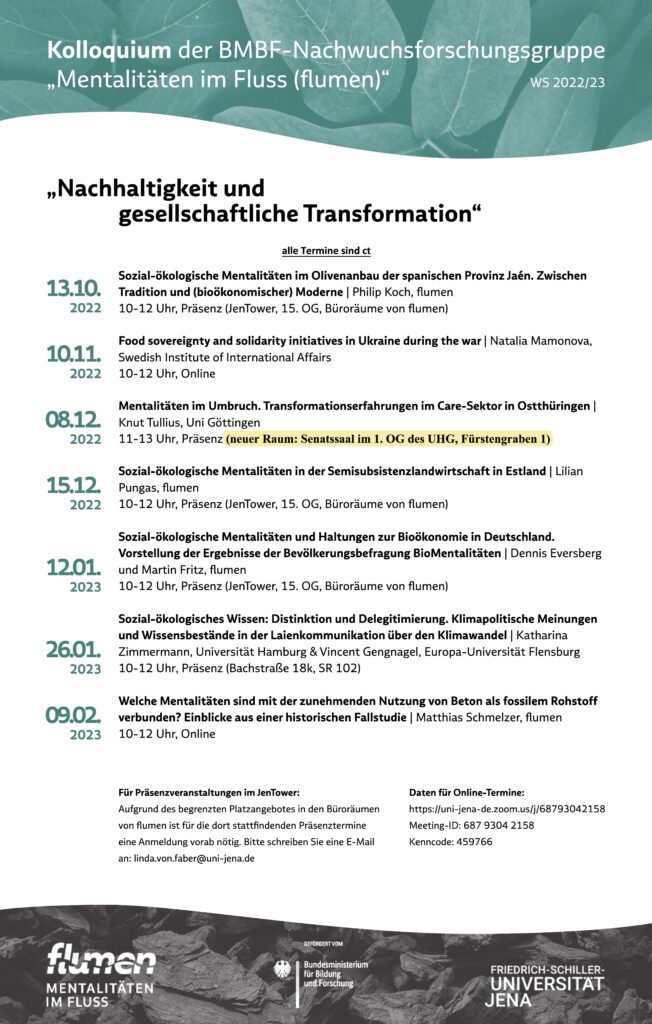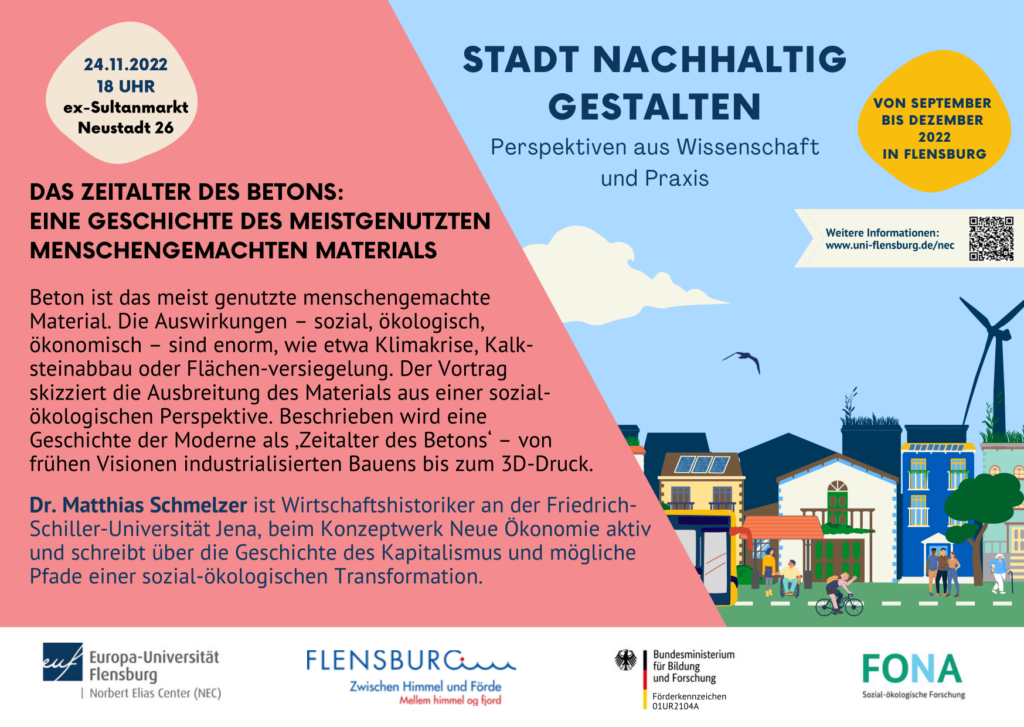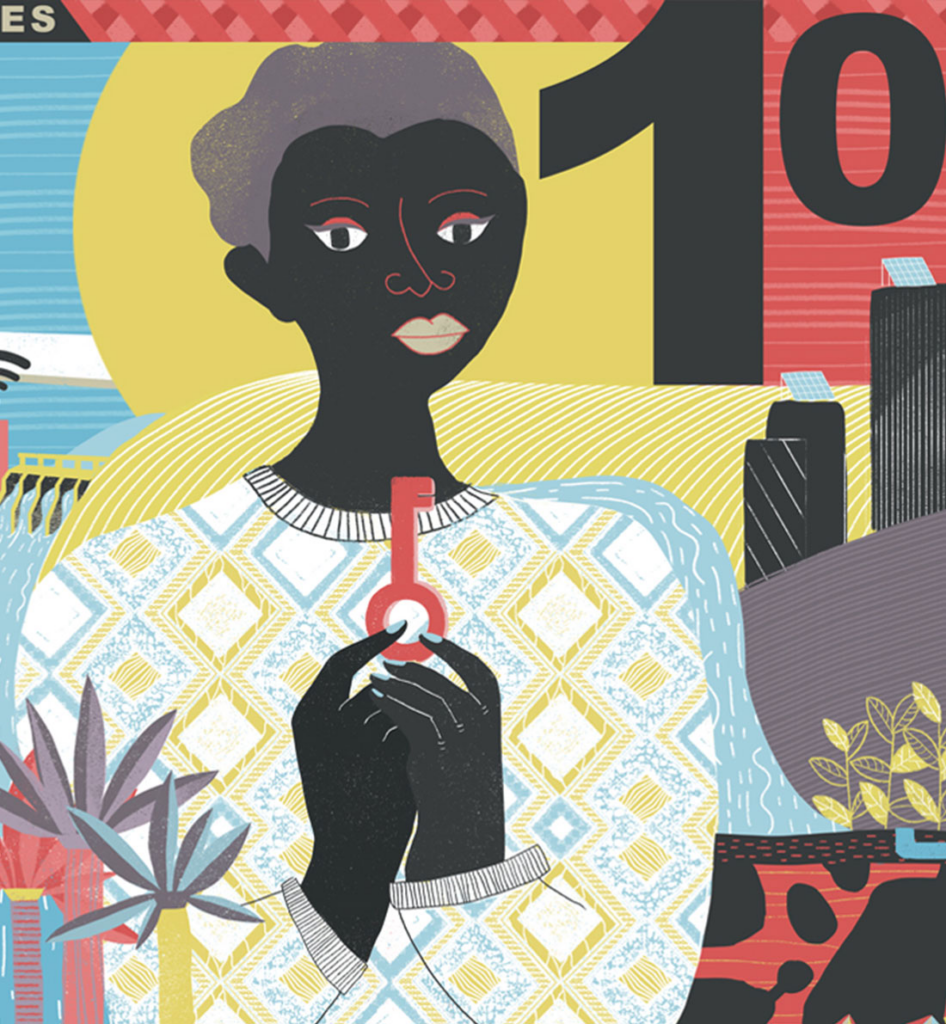Mehr Informationen zur Veranstaltung: https://www.ioew.de/veranstaltung/ausgewachsen-wirtschaften-als-gaebe-es-ein-morgen
Online-Vortrag von Natalia Mamonova zu „Food sovereignty and solidarity initiatives in Ukraine during the war“ im Rahmen des Kolloquiums von flumen am Donnerstag, 10.11.22, 10-12 Uhr
Am Donnerstag, dem 10.11.22, findet von 10 bis 12 Uhr der Online-Vortrag von Natalia Mamonova zu „Food sovereignty and solidarity initiatives in Ukraine during the war“ im Rahmen des Kolloquiums von flumen statt.

Die Zugangsdaten lauten:
https://uni-jena-de.zoom.us/j/68793042158
Meeting-ID: 687 9304 2158
Password: 459766
Matthias Schmelzer spricht zur sozial-ökologischen Geschichte von Beton bei der Veranstaltungsreihe „Stadt nachhaltig gestalten“ der Europa-Universität und Stadt Flensburg | 24. November 2022

Mehr zur gemeinsamen Vortragsreihe der Europa-Universität und der Stadt Flensburg für eine zukunftsfähige und sozial gerechte Stadt stehen hier.
Jana Holz und Lilian Pungas sprechen auf der Tagung der Nachwuchsgruppe Umweltsoziologie vom 25.-26. November 2022 in Oldenburg

Das Thema ihres Vortrags: „Socio-ecological transformations and conflicts within rural bioeconomies – Insights from empirical case studies in Finland and Estonia“
Mehr Informationen zum Event: https://ngumweltsoziologie.wordpress.com/2022/08/17/574/
Lilian Pungas spricht auf der AESOP-Sustainable Food Planning Conference in Almere, Niederlande, vom 20. bis 22. Oktober 2022
Lilian Pungas wird am Donnerstag, den 20. Oktober, ihre Forschungsergebnisse zum Thema „Dachas and food democracy – ambivalent roles during times of crisis?“ vorstellen.
Mehr Informationen hier: https://www.aesopsfp2022.com
Lilian Pungas spricht auf dem internationalen Workshop „Crisis, climate and challenges & opportunities of urban agriculture“ am 19. Oktober 2022
Lilian Pungas spricht auf dem internationalen Workshop „Crisis, climate and challenges & opportunities of urban agriculture“ am 19. Oktober 2022, den sie zusammen mit ihrem zweiten Doktorvater Dr. Oane Visser am ISS in Den Haag im Rahmen ihres Doppel-Doktoratsstudiums mitorganisiert. Sie wird ihre neuesten Forschungsergebnisse und Analysen zu Food Democracy am Beispiel der ostestnischen Datschen vorstellen. Vor dem Hintergrund des Krieges in der Ukraine, der sich verschärfenden Inflation in Estland und der politischen Spannungen zwischen ethnischen Esten und Russen sind demokratische Entscheidungsprozesse in lokalen Lebensmittelsystemen wichtiger denn je. Vor diesem Hintergrund der zahlreichen Krisen untersucht Lilian, was einen guten „Food Citizen“ in einer postsozialistischen städtischen Peripherie ausmacht.
Mehr Informationen zum Event gibt es hier: https://www.iss.nl/en/events/crisis-climate-and-challenges-opportunities-urban-agriculture-2022-10-19
Matthias Schmelzer hält einen Vortrag auf der International Conference: “The quest for economic and Monetary Sovereignty in 21st Century Africa: ”Facing the socio-ecological crisis: Delinking and the question of Global Reparations.” 25. bis 28. Oktober im Museum of Black Civilizations, Dakar, Senegal.
Philip Koch veranstaltet am 03. Oktober einen Transferworkshop an der Universidad de Jaén in Kooperation mit dem Instituto Universitario de Investigación en Olivar y Aceites de Oliva
Philip Koch veranstaltet am 03. Oktober einen Transferworkshop an der Universidad de Jaén in Kooperation mit dem Instituto Universitario de Investigación en Olivar y Aceites de Oliva. Hierbei stellt er das Thema und erste Ergebnisse seines Disserationsprojekts über Mentalitäten in Olivensektor von Jaén vor. Diverse Expert*innen des Sektors präsentieren zudem ihre Perspektiven über zukünftige Entwicklungen im Sektor im Zusammenhang mit der aufkommenden Bioökonomie. Das Publikum aus Akademiker*innen und Produzent*innen von Olivenöl diskutiert in kleiner Runde ausführlich über diverse Themen, um im Anschluss einen ökologisch bewirtschafteten Olivenhain zu besichtigen.
Philip Koch nimmt vom 26. bis 30. September 2022 an der Permanent European Conference for the Study of the Rural Landscape (PECSRL) “Living Together in European Rural Landscapes” in Jaén und Baeza teil
Philip Koch nimmt vom 26. bis 30. September 2022 an der Permanent European Conference for the Study of the Rural Landscape (PECSRL) “Living Together in European Rural Landscapes” in Jaén und Baeza teil und stellt dort Teile seiner Forschung vor. Er präsentiert seine Arbeit als Teil der Session “Landscapes of Mediterranean woody crops: permanences and transformations, vulnerabilities and challenges” mit anderen Wissenschaftler*innen aus dem Bereich Landschaftsplanung und Geographie.
In seinem Beitrag „The past and present bio(-based) economy of the olive sector in Jaén” am Dienstag, dem 27. September 2022 um 12:00 Uhr erläutert er, welche historischen Wurzeln der Olivenanbau in der Region Jaén hat und welche Auswirkungen kontemporäre politische Konzepte wie die andalusische Bioökonomie Strategie auf diesen Sektor haben.
Neue Publikation: Martin Fritz et al (2022): Ecological ceiling and social floor: public support for eco-social policies in Sweden.
Khan, Jamil / Emilsson, Kajsa / Fritz, Martin / Koch, Max / Hildingsson, Roger / Johansson, Håkan (2020): Ecological ceiling and social floor: public support for eco-social policies in Sweden. In: Sustainanility Science, https://doi.org/10.1007/s11625-022-01221-z
In der Studie geht es darum, herauszufinden, welche Personen sozial-ökologische Politikmaßnahmen wie z.B. ein Maximaleinkommen, ein bedingungsloses Grundeinkommen oder eine Arbeitszeitreduzierung unterstützen. Durch statistische Analysen einer repräsentativen Bevölkerungsumfrage in Schweden finden wir heraus, dass die politische Einstellung den größten Einfluss auf eine solche Unterstützung hat: Eher politisch links orientierte Personen befürworten alle abgefragten sozial-ökologischen Politimaßnahmen, politisch rechts stehende lehnen sie ab. Zusätzlich haben sozio-ökonomische Faktoren wie das Einkommen einen Einfluss auf solche Maßnahmen, die eher auf Umverteilung abzielen, während ein höheres Wissen über den menschengemachten Klimawandel die Zustimmung zu eher ökologisch ausgerichten Politikmaßnahmen wie einer Steuer auf Fleischprodukte verstärkt.


